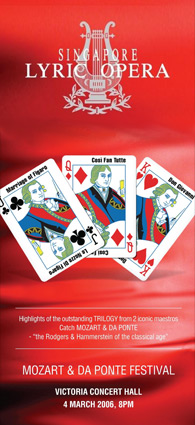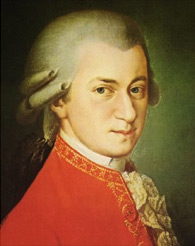
While the role of librettists is often considered secondary to their composers, it was different with Da Ponte. The brilliant librettist is credited as contributing to the success of the three operas and one simply cannot bring up the famous opera trilogy without mentioning both men.
Mozart had not written an opera since 1782 (The Abduction from the Seraglio), largely out of frustration over the lack of a good libretto, until his meeting with Da Ponte. The meeting proved to be a symbiotic match and Da Ponte's deep knowledge of classical and Italian literature, enabled him to provide the moving librettos that are to this day, enjoyed by millions around the world.
Sung in Italian with English and Chinese subtitles, the concert is performed by an international cast and Singapore Lyric Opera Chorus accompanied by the Singapore Lyric Opera Orchestra conducted by Joshua Tan.
Date: Saturday, 4 March 2006
Time: 8pm
Venue: Victoria Concert Hall
Ticket Prices: $25, $40, $50 & $60 (Prices exclude SISTIC fees)
Concession for students, NS men and senior citizens apply.
Tickets available at SISTIC authorised agents island-wide, hotline: 6348 5555 and website: www.sistic.com.sg.
More about The Marriage of Figaro, Don Giovanni and Così fan tutte on the next page.

The Singapore Lyric Opera celebrates the 250th anniversary of the birth of Wolfgang Amadeus Mozart and brings together highlights of the three operas from two great geniuses: Wolfgang Amadeus Mozart (above) and his librettist Lorenzo Da Ponte.
The Marriage of Figaro is based on the second play in a trilogy by Pierre Augustin Caron de Beaumarchais. The Count had married Rosine but their marriage disintegrated due to his philandering. Figaro is now the Count's major-domo and engaged to Suzanne, who is Countess Rosine's maid -- and the Count's intended conquest. Old Bartholo is back to seek revenge on Figaro for taking Rosine away from him, with the help of the unscrupulous music-master, Don Bazile. Adding to the fun are an amorous teenager, a scheming old maid, a drunken gardener, and a silly young girl. Much happens on a single folle journée - a crazy day. Mozart's librettist, Lorenzo da Ponte, took this popular play, removed "political" content that would have offended the Viennese imperial censors (the French Revolution was only a few years away), and faithfully translated the rest into Italian -- the customary opera language of the day. With Mozart's masterpiece of a score, the result was a witty yet profound tale of love, betrayal, and forgiveness.
Don Giovanni is a two-act drama giocoso* that opens with Leporello, Don Giovanni's servant, disclaiming the number of Don Giovanni's conquests - 1,003 in Spain. Don Giovanni, the infamous womaniser, makes one conquest after another until the ghost of Donna Anna's father, the Commendatore, (whom Giovanni killed) makes his appearance. He offers Giovanni one last chance to repent for his innumerous improprieties, failing which, be condemned to hell by evil spirits. It was said that Mozart wrote the overture for this great opera within three hours the night before its premiere. Gounod, the composer of "Faust" admired Don Giovanni, extolling it as "that unequalled and immortal masterpiece, that apogee of the lyrical drama".
Così fan tutte was the third and final of Mozart and Da Ponte's collaboration. The full name of this work is Così fan tutte, ossia La scuola degli amanti (Women are like that, or The School for Lovers). Based on a scandalous event in Vienna and commissioned by Emperor Josef II, this two-act drama giocoso* tells a story of two young officers, Ferrando and Guglielmo, who make a bet with the elderly cynic Don Alfonso that the two sisters Fiordiligi and Dorabella to whom they are engaged will be faithful when the officers are suddenly called away to war. Aided by Despina, the girls' maid, the young men return in disguise and start to woo one another's betrothed. After much persistence by the impostors, the sisters' resolve is broken and a double-marriage contract prepared. Suddenly the two officers return in their true guise to confront their lovers. The truth emerges and everything is forgiven.
